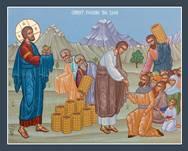Feeding the 5000
FEEDING THE 5000
Objectives:
- Students should identify these as 2 similar miracles of Jesus.

- Students should know the little boy shared 5 loaves and 2 fishes.
- Students should know that Jesus fed 5000 and 4000 men (plus more women and children) after blessing the food.
Possible Lesson Plan:
- Open with prayer.
- Scripture References: Luke 9: 11-17, John 6: 2-14, Mark 6: 32-46, Mark 8:1-9, Matthew 14: 13-23, 15:32-39. There are actually 2 separate but similar stories here. Before reading, write 2 headings on your blackboard or large tablet – “First” and “Second”. After reading, have the students compare and contrast the two miracles and summarize their findings in the two columns. Why were so many people there? They must have been hungry. What did the disciples want to do? What did Jesus feed them? Where did He get the food? What did Jesus do with it? How many were fed? (Note for the students that only men were counted. Why?) What was left over? Was this a miracle? Why or why not? Is there a time in the Old Testament when God miraculously fed His people? (yes, manna in the days of Moses). St. Cyril of Alexandria points out that this is one of the many times Jesus is seen fulfilling in His life the miracles He performed in the Old Testament by the prophets.
- Discuss giving: Did the little boy have to share his food? Why did he share? No one forced him to share his food – he wanted to. Jesus teaches us to share food with others. Do you bring lunch or snack to school? What if someone asks for something especially delicious from you? Will you share? Are there other ways we can share besides food? Brainstorm and write them down. St. Cyril states, “Nor did the miracle end here. There were also gathered twelve baskets of fragments. And what do we infer from this? A plain assurance that hospitality receives a rich recompense from God. The disciples offered five loaves. After a multitude this large had been satisfied, there was gathered for each one of them a basketful of fragments. Let nothing, therefore, prevent willing people from receiving strangers, no matter what there may be likely to blunt the will and readiness of men. Let no one say, ‘I do not possess suitable means. What I can do is altogether trifling and insufficient for many.’ Receive strangers, my beloved. Overcome that reluctance which wins no reward. The Savior will multiply the little you have many times beyond expectation.” (Homily on Luke)
- Play a learning game: Honesty Pays. Divide into 2 teams and line up. Give each player (randomly) a card with a fact about one of the two miracles:
Jesus blessed the food Jesus blessed the food
5000 men 4000 men
5 loaves and 2 fish 7 loaves and some small fish
12 baskets leftovers 7 baskets leftovers
little boy shared
Philip counted the money
Tell the students that their fact may be about the first miracle, the second, or both. But, tell them that Jesus wants them to be honest about their knowledge. The first member of Team 1 reveals his answer. The teacher will ask, “Do you know which miracle your fact belongs to?” If the student answers, “yes”, Team 2 has the right to challenge the student. If they do not challenge, Team 1 gets the point. If they challenge and he knows the fact, Team 1 gets the point. But, if they challenge and he does not know the fact, Team 2 gets the point. If the student answers “no”, Team 2 has the chance to give the correct answer and get the point. Play then passes to the first member of Team 2, with Team 1 having the right to challenge.
- Add to your time line as usual: one or both miracles?
- Close with the Lord’s Prayer: Give us this day our daily bread.